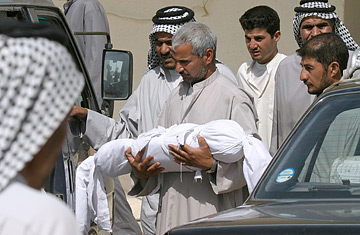
An Iraqi man carries the body of a child killed during an attack at a Polish Army base in Diwaniyah.
Amid reports of mounting Shi'a infighting there, officials in the Southern city of Diwaniyah, about 100 miles south of Baghdad, say that not only Iran but other neighboring countries in the Gulf may be involved in stoking the violence. Two incidents this week have ratcheted up their concern. On Wednesday, seven Iraqi police officers were killed by a bomb in the nearby village of Afak. That followed bloodshed on Monday, when at least six civilians were killed and dozens wounded in a mortar barrage on the Polish-run Coalition base in town.
Such spectacular incidents overshadow the almost daily clashes between the rival Shi'ite militias that inevitably kill and maim civilians. Diwaniyah now nearly rivals Basra as a vicious free-for-all in the growing civil war among the Shi'a. While none of the recent fighting can be directly linked to any outside group, local security officials say that they can now add to the list of troublemakers elements of al-Qaeda and other Sunni Arab fighters, who appear to be taking advantage of the chaos to regain a toehold in the region and accelerate the flow of Shi'a blood.
Diwaniyah's Iraqi security chief, Sheik Hussein Hadi al Buderi, said at least 50 "Afghans," local slang for Iraqi or foreign Sunni militants trained abroad for jihad, have recently "penetrated" the town. "Yes," he said, "there is a presence of al-Qaeda now in Diwaniyah."
Even without these new sectarian elements, clashes between Shi'a factions have made Diwaniyah a recent flashpoint in Iraq even as other areas, most notably cities in Anbar Province, have calmed down. The local government and security forces of Diwaniyah are largely controlled by the Supreme Islamic Iraqi Council (SIIC) and its armed wing, the Badr Corps, who are challenged almost daily in the streets by members of the rival Jaish al Mahdi, the militia loyal to cleric Moqtada al Sadr. (The SIIC was formerly known as the Supreme Council for Islamic Revolution in Iraq, with the initials SCIRI.) While both groups are engaged in a raw and bloody fight for dominance in the region, they are also pitted against each other by basic political positions that are key to the Shi'ite majority in search of a national identity and place in Iraq's future.
In general, the SIIC and Badr militia, who have shown more willingness to work with both the Coalition and Iran in their bid for power, advocate a soft partitioning of Iraq and the creation of a semi-autonomous political region in the South that they, of course, would control. The Sadrists, for their part, wrap themselves in a nationalist banner and advocate a strong central government in Baghdad, where the Sadrists have the majority of their most fervent constituency and the ear of the Shi'ite Prime Minister Nouri al Maliki, and where they run several key government ministries.
Although the two groups recently pledged to work together in an accord signed by Sadr and SIIC leader Abdul Aziz al Hakim two weeks ago in Iran, the power grab plays out daily on the streets of southern cities such as Diwaniyah. "What's happening in this town is like a political duel over who's going to govern," said Ali al Mayali, a Sadrist member of the Iraqi Parliament. "It's a fight to control the street." Fueling that fight, Mayali said, is money and other support from neighboring countries. He would not point fingers. While U.S. officials point to the presence of Iranian-trained cells of both Badr and Sadr militias in Diwaniyah, residents talk also of Saudi Arabia and other Gulf states having a hand in the growing violence. "There is a lot of money being spent in Diwaniyah and all over Iraq to create chaos and intolerance," Mayali said.
Besides Sadr's Jaish al Mahdi and Hakim's Badr Corps, a new group has recently surfaced in the city called the Brigade of Hussein, named after the 7th Century Shi'ite martyr Imam Hussein, the central figure of Shi'a Islam. The group claimed responsibility for the recent attack on the Polish ambassador in Baghdad, a coordinated ambush that included a series of timed explosions and pre-planned gunfire that wounded the ambassador and killed one of his security guards. In Diwaniyah, locals say these armed groups may focus their attention on the local Polish base in the city in an effort to push the Coalition out of the city. That's just what the militias did with the British in Basra, leaving the city up for grabs for an all-out fight for power, an intra-sect bloodbath that Sunni extremists would only love to hasten and exploit. With reporting by TIME's Iraqi staff in the South
